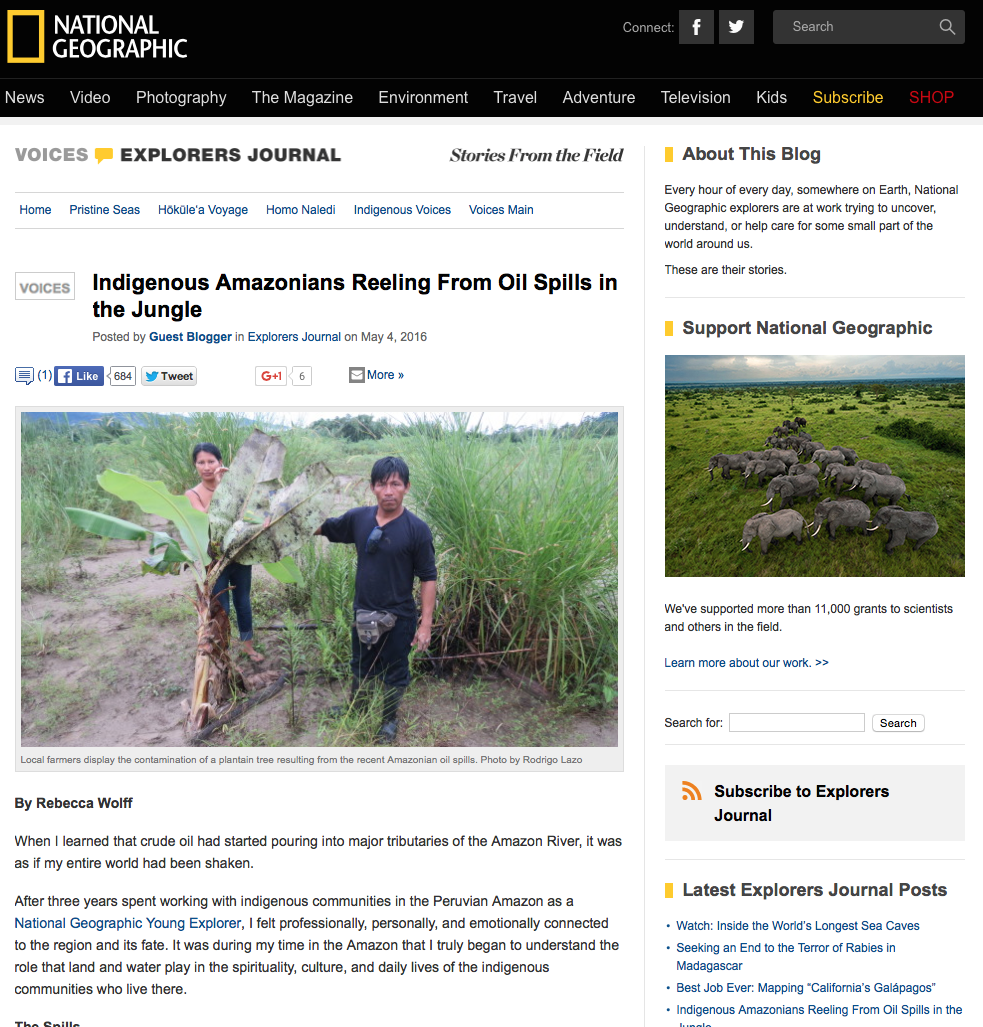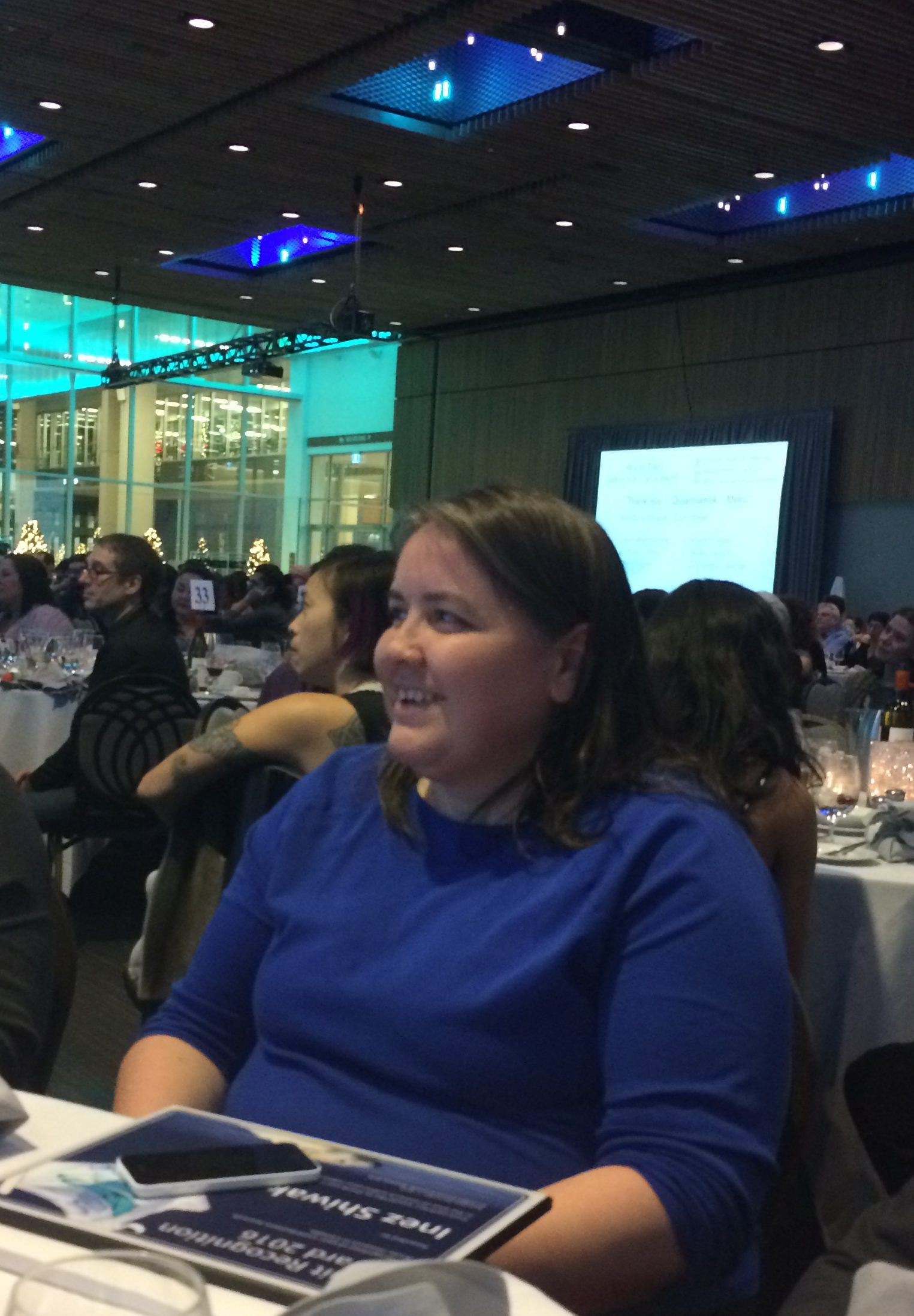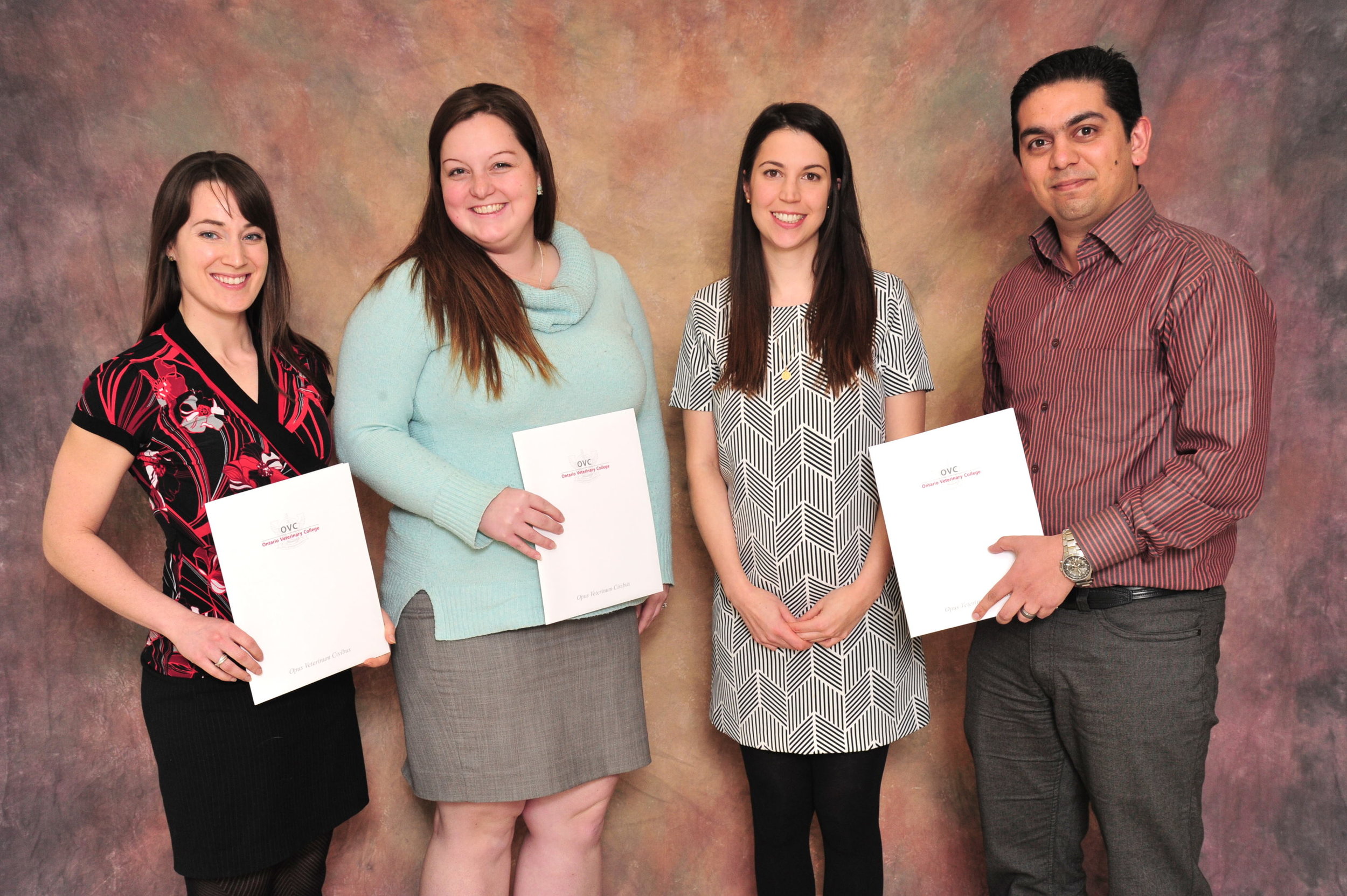Congratulations to Stephanie Masina (MSc Candidate) for winning second place in the poster competition at the Centre for Public Health and Zoonoses Annual Symposium. Click here to read the OVC Bulletin Story on the Symposium and Stephanie's poster prize.
Congratulations to Carlee Wright for Successfully Defending her MSc thesis Research!
Carlee graduated with distinction from her BSc in Biological Sciences from the University of Guelph in 2014. She then started her MSc in Epidemiology in the Department of Population Medicine (OVC) and earned a 91% average in her coursework. Outside of her coursework, she was a Teaching Assistant (TA) for the graduate-level Epidemiology I course in 2015, a member of the EcoHealth Community of Interest (2014-present), and an active member of the journal club (2014-present). Carlee conducted community-led research on drinking water quality and safety, led by the community of Rigolet (see thesis abstract below). She presented this research at 3 national and 5 international conferences, including 8 poster and 7 oral presentations, many of which were co-presented with Inez Shiwak (an Inuit research associate from Rigolet). To support her research, Carlee won over $62,000 in scholarships and research grants; her research has taken her to Nunatsiavut, Alaska, Oxford, Montreal, and other locales.
It has been an absolute pleasure to work with Carlee over the past few years; she is a great thinker, writer, and analyst. Congratulations Carlee!
graduated with distinction from her BSc in Biological Sciences from the University of Guelph in 2014. She then started her MSc in Epidemiology in the Department of Population Medicine (OVC) and earned a 91% average in her coursework. Outside of her coursework, she was a Teaching Assistant (TA) for the graduate-level Epidemiology I course in 2015, a member of the EcoHealth Community of Interest (2014-present), and an active member of the journal club (2014-present). Carlee conducted community-led research on drinking water quality and safety, led by the community of Rigolet (see thesis abstract below). She presented this research at 3 national and 5 international conferences, including 8 poster and 7 oral presentations, many of which were co-presented with Inez Shiwak (an Inuit research associate from Rigolet). To support her research, Carlee won over $62,000 in scholarships and research grants; her research has taken her to Nunatsiavut, Alaska, Oxford, Montreal, and other locales.
It has been an absolute pleasure to work with Carlee over the past few years; she is a great thinker, writer, and analyst. Congratulations Carlee!
Carlee's Thesis Abstract:
Canadian Inuit have often reported concerns about the quality of their municipal drinking water. This research took an EcoHealth approach to investigate drinking water perceptions and consumption patterns, as well as drinking water contamination and its potential associations with acute gastrointestinal illness (AGI) in the Inuit community of Rigolet, Canada. Three census cross-sectional surveys (n=226-246) captured data on AGI, drinking water use, and water storage (2012-2014). Bacterial contamination of household drinking water was assessed alongside the 2014 survey. Concerns regarding taste, smell, and colour of tap water were associated with lower odds of consuming tap water. The use of transfer devices (e.g. small bowls or measuring cups) was associated with household water contamination. No water-related risk factors for AGI were identified. Results of this study are intended to inform safe water management practices, as well as contextually appropriate drinking water interventions, risk assessments, and public health messaging in the Arctic. Click here to access Carlee's Thesis.
Research Photos of Carlee
Congratulations to Manpreet Saini for successfully defending her MSc thesis research!
Written by Dr. Steven Roche
 Manpreet began her post-secondary education at McMaster University in 2009, where she majored in Biology. She received both the McMaster Entrance Scholarship for academic excellence and made the Dean’s Honour List in her final three years of her undergraduate degree, graduating with Honours in 2013.
Manpreet began her post-secondary education at McMaster University in 2009, where she majored in Biology. She received both the McMaster Entrance Scholarship for academic excellence and made the Dean’s Honour List in her final three years of her undergraduate degree, graduating with Honours in 2013.
Manpreet came to the Department of Population Medicine in Fall 2014 and has been amazing to work with. She added to her academic achievements right away and hasn’t looked back, receiving the Queen Elizabeth II Graduate Scholarship in Science & Technology and the NCCPH Knowledge Translation Graduate Student Award. She completed her courses with an average of 91%, has participated in 3 national conferences, winning an award for top poster presentation, and traveled from coast to coast for research and conferences.
It has been a pleasure to watch Manpreet grow both personally and professionally.
Research Photos of Manpreet
Congratulations to Alex on her PhD Candidacy!
 Congratulations to Alexandra Sawatzky for successfully completing her PhD qualifying exams!
Alexandra finished her undergraduate degree in Arts & Science with a cumulative GPA of 89%, and directly entered into a PhD program in Public Health at the University of Guelph. Her research interests include the wellbeing of Indigenous peoples in Canada, integrated environment and health surveillance, as well as physical, mental, emotional, spiritual, and social impacts of climatic and environmental change in Inuit communities. Recognizing her academic aptitude, she has been awarded over $100,000 in scholarships and travel grants to support her PhD research.
Congratulations to Alexandra Sawatzky for successfully completing her PhD qualifying exams!
Alexandra finished her undergraduate degree in Arts & Science with a cumulative GPA of 89%, and directly entered into a PhD program in Public Health at the University of Guelph. Her research interests include the wellbeing of Indigenous peoples in Canada, integrated environment and health surveillance, as well as physical, mental, emotional, spiritual, and social impacts of climatic and environmental change in Inuit communities. Recognizing her academic aptitude, she has been awarded over $100,000 in scholarships and travel grants to support her PhD research.
Sharing her research with the scientific community include two peer-reviewed publications, as well as seven oral and five poster presentations at national and international conferences. In addition, she has authored 25 research-related reports, and writes an insightful and reflective blog, "Unlearn. Relearn. Repeat."
It has been a pleasure working with Alexandra over the past two years, and we are thrilled to continue working with Alexandra as she begins her PhD Candidacy!
Research Photos of Alexandra
New Publication! Climate Change and Acute Respiratory Illness in Indigenous Populations
 Congratulations to Kate Bishop Williams for her new publication in the journal Systematic Reviews.
This article outlines the protocol that Kate will use to conduct a systematic review to investigate whether associations between acute respiratory illness and seasonal or meteorological parameters differ between Indigenous and non-Indigenous groups residing in the same geographical region.
Congratulations to Kate Bishop Williams for her new publication in the journal Systematic Reviews.
This article outlines the protocol that Kate will use to conduct a systematic review to investigate whether associations between acute respiratory illness and seasonal or meteorological parameters differ between Indigenous and non-Indigenous groups residing in the same geographical region.
Citation: Bishop-Williams KE, Sargeant JM, Berrang-Ford L, Edge VL, Cunsolo A, Harper SL. A protocol for a systematic literature review: comparing the impact of seasonal and meteorological parameters on acute respiratory infections in Indigenous and non-Indigenous peoples. Systematic Reviews 2017; 6(1): 19. Click here for free open-acces to the article.
Abstract:
Background: Acute respiratory infections (ARI) are a leading cause of morbidity and mortality globally, and are often linked to seasonal and/or meteorological conditions. Globally, Indigenous peoples may experience a different burden of ARI compared to non-Indigenous peoples. This protocol outlines our process for conducting a systematic review to investigate whether associations between ARI and seasonal or meteorological parameters differ between Indigenous and non-Indigenous groups residing in the same geographical region.
Methodology: A search string will be used to search PubMed®, CAB Abstracts/CAB Direct©, and Science Citation Index®aggregator databases. Articles will be screened using inclusion/exclusion criteria applied first at the title and abstract level, and then at the full article level by two independent reviewers. Articles maintained after full article screening will undergo risk of bias assessment and data will be extracted. Heterogeneity tests, meta-analysis, and forest and funnel plots will be used to synthesize the results of eligible studies.
Discussion and registration: This protocol paper describes our systematic review methods to identify and analyze relevant ARI, season, and meteorological literature with robust reporting. The results are intended to improve our understanding of potential associations between seasonal and meteorological parameters and ARI and, if identified, whether this association varies by place, population, or other characteristics. The protocol is registered in the PROSPERO database (#38051).
New Publication! Seasonal variation of food security among Ugandan Indigenous Batwa
 Congratulations to Kaitlin Patterson on her publication in Public Health Nutrition! Her article examines the sensitivity of the food system of an Indigenous African population, the Batwa of Kanungu District, Uganda, to seasonal variation. She used mixed qualitative and quantitative methods to characterize one of the highest food insecure populations in the published literature. Her results are being used by local Ugandan NGOs to prioritize development-related decision making in the region.
Access the article here (free, open-access).
Congratulations to Kaitlin Patterson on her publication in Public Health Nutrition! Her article examines the sensitivity of the food system of an Indigenous African population, the Batwa of Kanungu District, Uganda, to seasonal variation. She used mixed qualitative and quantitative methods to characterize one of the highest food insecure populations in the published literature. Her results are being used by local Ugandan NGOs to prioritize development-related decision making in the region.
Access the article here (free, open-access).
Congratulations Kate!
Abstract:
Climate change is projected to increase the burden of food insecurity (FI) globally, particularly among populations that depend on subsistence agriculture. The impacts of climate change will have disproportionate effects on populations with higher existing vulnerability. Indigenous people consistently experience higher levels of FI than their non-Indigenous counterparts and are more likely to be dependent upon land-based resources. The present study aimed to understand the sensitivity of the food system of an Indigenous African population, the Batwa of Kanungu District, Uganda, to seasonal variation. A concurrent, mixed methods (quantitative and qualitative) design was used. Six cross-sectional retrospective surveys, conducted between January 2013 and April 2014, provided quantitative data to examine the seasonal variation of self-reported household FI. This was complemented by qualitative data from focus group discussions and semi-structured interviews collected between June and August 2014. Ten rural Indigenous communities in Kanungu District, Uganda. FI data were collected from 130 Indigenous Batwa Pygmy households. Qualitative methods involved Batwa community members, local key informants, health workers and governmental representatives. The dry season was associated with increased FI among the Batwa in the quantitative surveys and in the qualitative interviews. During the dry season, the majority of Batwa households reported greater difficulty in acquiring sufficient quantities and quality of food. However, the qualitative data indicated that the effect of seasonal variation on FI was modified by employment, wealth and community location. These findings highlight the role social factors play in mediating seasonal impacts on FI and support calls to treat climate associations with health outcomes as non-stationary and mediated by social sensitivity.
Keywords: Seasonal variation, Food security, Indigenous populations, Social determinants of health, Mixed methods
Congratulations to Inez Shiwak for Winning the National Inuit Recognition Award!
The Inuit Recognition Award is a national prize that recognizes Inuit who are making strong efforts towards meaningful Inuit involvement in Arctic research. Each year, the award is given to one recipient who has shown excellence in research. The award is facilitated by Inuit Tapiriit Kanatami, which is the national representational organization that protects and advances the rights and interests of Inuit in Canada.
Inez Shiwak was awarded the prize this year, recognizing her outstanding research leadership and accomplishments in Arctic research.
Ashlee Cunsolo and I had the immense pleasure and privilege to present Inez Shiwak with the Inuit Recognition Award at the ArcticNet #ASM2016. Below is a copy of our speech.
Inuit Recognition Award Speech, 2016
Ashlee: Thank you for the introductions, Rodd, and good evening everyone. I’m Ashlee Cunsolo, the Director of the Labrador Institute of Memorial University.
Sheri: And I’m Sherilee Harper, an Assistant Professor at the University of Guelph.
Ashlee: It gives us great pleasure to be announcing the recipient tonight for this award. We have worked with this individual for 7 years, and can say, without a doubt that she had changed the ways in which we approach and conduct research, and the ways in which we understand the transformative potential that research has to make positive social change, if led by Inuit and responsive to Inuit needs and priorities.
On Tuesday morning, ITK President Natan Obed spoke about the ways in which Inuit bring important diversity and richness to Arctic science and no one better exemplifies this than the recipient of this award.
Sheri: A quick listing of the recipient’s research experience will illustrate this diversity and richness. She has conducted research in food security, water quality, cultural continuity and preservation, knowledge sharing and translation, climate change and health, mental health, and youth engagement. She has conducted research through interviews, focus groups, and surveys, has taken water and hair samples and conducted scientific testing, and has pioneered the use of participatory digital media in the North.
From this research, she has given over 50 oral presentations, participated in over 30 poster presentations, is an author on 15 peer-reviewed publications and 2 book chapters in various roles, with several forthcoming or under review. She has worked on the creation of over 40 digital stories, was a lead on 1 documentary film, and is currently working on another.
Ashlee: While this list of research accomplishments is nothing short of amazing, what is truly impressive is the ways in which others wrote about her in the nomination package. We would like to share some of these quotations today:
"From a member of the federal government: “Overall, I know [her] to be an incredibly talented researcher and exceptional person. What she has done, and is currently doing, for Inuit-led research in the North not only benefits research and government, it has powerful impacts for Inuit themselves. [She] provides a model, and a standard, for how community-based research should be conducted, and has demonstrated time and time again the benefits that can come from research that is designed and driven by Inuit, for Inuit.”
Sheri: From a Rigolet resident: “With [her] at the helm… we can be assured that the benefits stemming from her efforts transcend boundaries beyond academia and into the real-life environment and health issues we are currently facing in our community, and that the benefits are sustained into the future. …I am honoured to be able to work so closely with [her]. She embodies the spirit and strength of our community, and she plays an influential role in inspiring this spirit and strength in our youth so that it is perpetuated and sustained for years to come.”
Ashlee: From a government partner: “Research priorities and concerns in the North must be put forward by Inuit communities themselves, and these communities must have control over the development and direction of all decisions and actions. Not only is [she] a talented researcher and respected leader in her community, she is an advocate for collaboration between governments and Inuit stakeholders to develop and evaluate culturally-acceptable and effective research and knowledge translation. … [Her] efforts at the forefront of such research create a shared sense of political and cultural resiliency and self-determination among Inuit in Canada. Her work is a testament to the importance of Inuit autonomy and control over their own research and for sharing information with others in the hopes of creating further awareness and policy change.”
Sheri: And finally, from one of the many graduate students with whom the recipient has supported and mentored: “As researchers, we are unbelievably fortunate for the openness, kindness, thoughtfulness, and knowledge that she shares with us. It is people like [her] that are changing research for the better, one reflection, decision, project, and grad student at a time. … She is open, kind, and supportive of students doing work with the community, and she never ceases to amaze me with her dedication to being involved in Arctic research. It is truly inspiring to see this happening in my journey as a young researcher, and I know that these experiences have positively impacted by own development, and will carry forward as I continue in my career.”
We are incredibly privileged to work with this individual, and are so thrilled that her wonderful work and contributions, which are done with great humour and much humbleness, are recognized with this award.
Ashlee & Sheri: It gives us great pleasure to announce that the 2016 recipient of the Inuit Recognition Award is Inez Shiwak, from Rigolet, Nunatsiavut!
EcoHealth Posters at ArcticNet Annual Scientific Meeting
Written by Sherilee Harper The poster session is one of my favourite aspects of the ArcticNet Annual Scientific Meetings, and this year was no exception. Of all the conferences that I have participated in, the ArcticNet poster session is among the best attended and most engaging poster sessions.
Our research group had a number of posters presented at this conference, showcasing work that ranged from climate change impacts on mental health and wellbeing, to community-based climate-health monitoring, to place-attachment and maternal health, to caribou documentaries, to one-health projects.
Members from our research group were awarded 1st and 2nd place in the Graduate Student Poster Competition! Congratulations David and Alexandra for your 1st and 2nd place win (respectively)!
Students Share Their EcoHealth Research at the OVC Graduate Research Symposium
Written by Anna Manore, MSc Candidate
On November 16th, students from the Harper Lab showcased their work at the OVC Graduate Student Research Symposium through posters and oral presentations. Students Danielle Julien and Anna Manore took home the 1st place prizes in the PhD and MSc poster competitions, respectively.
See student posters here!
Congratulations Kaitlin Patterson!
 Congratulations to Kate Patterson for successfully completing her PhD Comprehensive Exams! Kate is now, officially, a PhD Candidate in Epidemiology & International Development. Kate's PhD research will use EcoHealth approaches to studying maternal health of the Indigenous Batwa in Uganda. Her PhD Comprehensive Exams included an exam in International Development (research proposal and defense), as well as an exam in Epidemiology (covering four topics: General Epidemiology, Analytic Epidemiology, Survey Design, and Statistics for Small Populations).
Congratulations to Kate Patterson for successfully completing her PhD Comprehensive Exams! Kate is now, officially, a PhD Candidate in Epidemiology & International Development. Kate's PhD research will use EcoHealth approaches to studying maternal health of the Indigenous Batwa in Uganda. Her PhD Comprehensive Exams included an exam in International Development (research proposal and defense), as well as an exam in Epidemiology (covering four topics: General Epidemiology, Analytic Epidemiology, Survey Design, and Statistics for Small Populations).
Congratulations Kate!
Congrats to Rebecca Wolff on her Publication in National Geographic's Explorers Journal!

Congratulations to Rebecca Wolff for her recent publication in National Geographic's Explorers Journal!
To read her article, entitled "Indigenous Amazonians Reeling From Oil Spills in the Jungle," click here!
OVC Graduate Student Recognition Award Winner!
MSc Graduate Sarah Syer Transitions from Researching Paediatric Malnutrition to Childhood Cerebral Palsy!
 After graduating from the EcoHealth Lab where she studied childhood malnutrition, Sarah Syer is continuing her health research career as a Research Assistant at ErinoakKids Centre for Treatment and Development (Mississauga). The research project she is working on is funded by the Ontario Brain Institute (OBI) and is called CP-NET (Childhood Cerebral Palsy Integrated Neuroscience Discovery Network), which aims to improve the understanding of cerebral palsy and accelerate the development of new treatments. She is working closely with a developmental paediatrician, who is the principle investigator at the ErinoakKids site.
Interested in learning more about the organization that Sarah is now working with? Click below to learn more about OBI's plan and goals for the project:
After graduating from the EcoHealth Lab where she studied childhood malnutrition, Sarah Syer is continuing her health research career as a Research Assistant at ErinoakKids Centre for Treatment and Development (Mississauga). The research project she is working on is funded by the Ontario Brain Institute (OBI) and is called CP-NET (Childhood Cerebral Palsy Integrated Neuroscience Discovery Network), which aims to improve the understanding of cerebral palsy and accelerate the development of new treatments. She is working closely with a developmental paediatrician, who is the principle investigator at the ErinoakKids site.
Interested in learning more about the organization that Sarah is now working with? Click below to learn more about OBI's plan and goals for the project:
http://www.braininstitute.ca/cpnet/CP-intro.html
Farewell and congratulations Sarah!
Best of luck with all of your future endeavours and adventures!
Congratulations to Sarah Syer for Completing her MSc!
Congratulations to Sarah Syer for successfully defending her MSc research in January, and convocating with a MSc in Epidemiology this week! Photos below: Sarah at the UofG Grad Lounge receiving her customary Defense Mug; Sarah at UofG Convocation


Lab Members Win Poster Presentation Prizes at ArcticNet Annual Scientific Meeting!
Congratulations to Kaitlin Patterson!
Kate Patterson won 2nd prize for best PhD oral presentation on November 18th at the Ontario Veterinary College Graduate Student Research Conference. Kate gave an oral presentation on the seasonal variation of food security among the Batwa of Kanungu.
Congratulations to Rebecca Wolff!
Congratulations to Rebecca Wolff for winning the overall prize and poster competition for the "most innovative research" at the Canadian Conference For Global Health.
Poster Citation: Wolff, R., Harper, S.L., et al. "Its spirit is strong: Shawi healers, spirits and diarrhea in the Amazon" Canadian Conference of Global Health, Montreal. 5-6 November 2015.
Abstract
Waterborne illness remains a public health challenge faced by many Indigenous communities. The Shawi, a dominant Indigenous group in the Peruvian Amazon, have retained the majority of their cultural practices and belief systems. Indigenous illness perceptions may not always reflect known biomedical causes of disease, making some health interventions ineffective. The goal of this research was to explore how Shawi perceptions on the causes of diarrhea, as a symptom of waterborne illness, related to Shawi beliefs and cosmology about water. Semi-structured interviews were conducted in two Shawi communities in August 2014 to document beliefs regarding water spirits and the role of traditional healers in causing diarrhea. Results of this study showed Shawi perceptions on the causes of diarrhea were predominately based in beliefs around water spirits and the ability of traditional healers to cause diarrhea, as opposed to a belief in diarrhea caused by biomedical risk factors for waterborne illness, such as the consumption of contaminated water. This research highlights how understanding Indigenous perceptions of illness is essential to informing the design of more effective health interventions to reduce waterborne illness in Amazonian Indigenous Communities.
Key words: Cosmology, Gastrointestinal illness, Indigenous, Peru, Shawi, Water
Congrats to Kate Bishop!
Congratulations to Kate Bishop! Her IHACC research was profiled by the University of Guelph in an article entitled "Global climate change affecting indigenous people, at home and abroad." To read the article, click here.

Kate Bishop-Williams Wins Photo Competition
Congratulations to Kate Bishop-Williams for winning the Graduate Studies Photo Competition. Kate won 2nd place in the Student Life category for her photo “Forever a Gryphon”, which was a great picture that showed the joy and pride of being a Guelph graduate student.
The prize included $200, which was credited towards her tuition.
Congrats Kate!
CIHR Scholarship Winner!
Congratulations to Jacqueline Middleton on winning a prestigious CIHR scholarship! Jacqueline will be working with Drs. Harper and Cunsolo Willox on the epidemiology of mental health and wellbeing in the Arctic.



